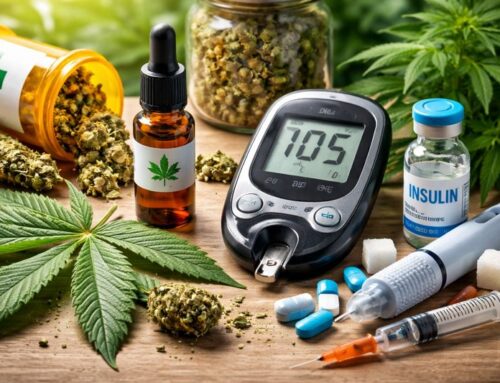From a historical perspective, the use of Cannabis has been documented in various cultures for both medical and recreational reasons. More recently, Cannabis has gained popularity as a natural sleep aid for individuals who have insomnia and chronic pain. To many people, it is viewed as a holistic approach to promoting calmness and relaxation, making it widely accepted by people looking to solve their sleep problems.
In this section, we will delve deeper into how Marijuana impacts your ability to independently fall asleep and suggest the possibility of sleep improvement along with a few pointers. So, how Can Medical Marijuana Help Improve Sleep? Let’s get started!
How does Medical Marijuana Help Improve Sleep?
What Are Cannabinoids and Why They Matter To understand how Cannabis impacts Sleep, we need to look at the endocannabinoid system (ECS). The ECS is a network in our body that includes receptors and chemicals. Cannabinoids are the active ingredients in Cannabis and connect with the ECS, affecting different processes, including Sleep.
The Impact of THC and CBD on Sleep The two primary cannabinoids of interest are tetrahydrocannabinol (THC) and cannabidiol (CBD). THC is recognized for its psychoactive effects, which can assist individuals in achieving better Sleep. In contrast, CBD provides a more serene experience, promoting relaxation without inducing a high.
How Terpenes Help with Sleep Terpenes are natural compounds that give Cannabis its unique smells and flavors. Some terpenes, like myrcene and linalool, might help with Sleep due to their relaxing qualities, possibly boosting the benefits of marijuana for sleep.
Benefits of Marijuana for Sleep
Marijuana can assist patients suffering from sleep disorders or chronic pain in the following ways:
- Quicker Sleep Onset: Marijuana helps in sleep induction. THC helps calm the mind and reduce stress.
- Pain Patients and Sleep: Chronic pain patients often have difficulty sleeping for long durations. Cannabis can control the pain and aid in healing.
- Alleviated Anxiety and Stress: Anxiety is also one of the issues that is responsible for sleep problems. Cannabis helps in relieving anxiety, which calms the user.
- Enhanced Deep Sleep: Cannabis is known to increase deep Sleep, which is the most restorative state of Sleep and improves recovery and quality.
- Non-Prescriptive Sleep Medication: Some people prefer Medical Marijuana over sleep medications, which are normally prescribed due to having detrimental side effects.
These drawbacks can greatly help someone with serious sleep problems. However, it is also important to think about the downsides.
Risks of Using Marijuana for Sleep
Cannabis has benefits, but it also has risks. Using it for a long time or in high amounts can lead to problems.
Impact on Sleep: Cannabis reduces REM sleep, which is important for thinking and emotional health. Over time, this can hurt memory, mood, and focus.
Tolerance and Dependence: Regular cannabis users often build tolerance. This means they need to use more to get the same sleep benefits, which raises the risk of dependence.
Morning Tiredness: Some people wake up feeling tired or groggy after using Cannabis. This “weed hangover” can affect their daily productivity and energy.
Side Effects: Higher THC doses can cause dizziness, dry mouth, and a faster heart rate. Long-term use can harm lung health, especially if smoked.
Disrupted Sleep Patterns: Cannabis can disturb normal sleep stages. While it may increase deep Sleep, it decreases REM sleep. Eventually, this imbalance can hurt overall sleep quality.
Mental Health Effects: Long-term cannabis use might make anxiety, depression, or other mental health issues worse for some people.
It’s important to think about these risks along with the benefits. Using Cannabis Marijuana for Sleep occasionally may help, but relying on it regularly can cause more harm than good.
Is it Okay to use Medical Marijuana for Sleep?
Marijuana may aid individuals with severe sleep issues or chronic pain by promoting faster sleep onset, reducing anxiety, and enhancing deep Sleep. However, it is important to acknowledge that its use can decrease REM sleep and lead to tolerance over time.
Using Cannabis occasionally may help you sleep better. However, using it regularly can interfere with your sleep patterns and harm your mental health. It’s important to use Cannabis carefully and notice how it affects your sleep quality.
If you’re dealing with persistent sleep troubles, consider consulting with medical cannabis doctor and exploring additional ways to enhance your sleep quality. Adopting healthy sleep habits, engaging in cognitive behavioral therapy (CBT), and incorporating regular exercise into your routine are effective long-term strategies.
The Science Behind Medical Cannabis and Sleep
Cannabinoids and Sleep Connection To understand how Cannabis affects Sleep, it’s important to look at the science behind it. Cannabis interacts with the endocannabinoid system (ECS), which controls functions like Sleep, mood, and appetite. The ECS has two main types of receptors, CB1 and CB2, found throughout the brain and body. Cannabinoids like THC and CBD attach to these receptors, affecting the brain’s neurotransmitters and other systems that control Sleep.
Research shows that THC, when used correctly, can make deep Sleep last longer. Deep Sleep is the most restorative phase of Sleep. However, THC may also reduce REM sleep, which can have both good and bad effects depending on the person. For some, falling asleep easily and having deeper Sleep is more important than losing REM sleep. For others, the lack of REM sleep can lower sleep quality.
CBD, on the other hand, does not change sleep stages like THC. Instead, it helps by reducing anxiety and stress, common problems for good Sleep. It may not directly change how you sleep, but it can help you fall asleep more easily and stay asleep at night.
Different Stages of Sleep
Sleep is divided into several stages: light Sleep, deep Sleep, and REM sleep. Each stage of Sleep has its function:
- Light Sleep: This is the beginning stage of Sleep, where your body relaxes, and your heart rate and breathing slow down. It’s the stage where you can be easily awakened.
- Deep Sleep: This is the most restorative stage of Sleep, where the body repairs itself, strengthens the immune system, and consolidates memories. THC promotes more time in deep Sleep, which can be helpful for those who need physical recovery.
- REM Sleep: This is the stage of Sleep when dreaming occurs, and it’s important for emotional processing, memory, and learning. THC can reduce the time spent in REM sleep, which could concern people who need this stage to process emotions and memories.
Using Cannabis For Sleep
If you want to use weed to help you sleep, it is recommended that you use an Indica strain as it promotes relaxation. Take a starting dose, especially if it’s your first time; this will help you avoid feeling overly drowsy in the morning. Try taking the dose 30 to 60 minutes before bedtime. It’s better to use edibles or vaporizers rather than smoking, as smoking is damaging to the lungs. Please do not use it every night, as this may encourage dependence. Consult with medical marijuana doctor if you have any medical conditions or take medication. Do not combine weed with alcohol or any other depressants, and ensure that the use of Marijuana is legal in your location, following medical marijuana laws in your area
Conclusion
Medical Marijuana can aid in enhancing Sleep for patients. The two main components, THC and CBD, will help induce faster sleep onset and longer duration. In the mornings, some side effects can be sleep inertia, which is often described as a ‘foggy’ feeling.
Research is still being conducted on the relationship between Sleep and weed, but for now, it may help someone feel more rested in the morning. However, speaking with a health professional regarding any concerns is important.
FAQs
How Can I Obtain a Medical Marijuana Card to Access Cannabis for Sleep?
To access medical marijuana for sleep, you need to obtain a medical marijuana card through your local state's health department. The process typically involves consulting with a licensed doctor who will assess your medical history and conditions. Once approved, the card allows you to legally purchase cannabis from a medical cannabis dispensary. Ensure you follow state regulations for obtaining the card and access to marijuana.
What is the Difference Between Delta 9 THC and Delta 8 for Sleep?
Delta 9 THC and Delta 8 THC are both cannabinoids found in cannabis, but they have different effects. Delta 9 THC is the more potent psychoactive compound that can help with sleep by promoting relaxation and reducing anxiety. Delta 8 THC, on the other hand, is less potent but still offers calming effects, making it a milder alternative for those who may be sensitive to the stronger effects of Delta 9. Both compounds can promote better sleep, but it's important to consult with a medical marijuana professional before choosing which is best for you.
How Long Does Medical Cannabis Stay in the Body?
The amount of time medical cannabis stays in your body depends on several factors, including the type of cannabis used, frequency of use, and metabolism. On average, cannabinoids like Delta 9 THC can remain in your system for up to 30 days in regular users, while occasional users may see quicker elimination. If you're using cannabis for sleep, it's important to be aware of how it may impact you over time. Always consult with a healthcare provider to understand how long cannabis may stay in your body based on your usage.
What Is Hemp in Kentucky, and How Does It Relate to Medical Cannabis?
Hemp in Kentucky plays a significant role in both the agricultural and medicinal cannabis sectors. While hemp contains very low levels of Delta 9 THC, it is used to produce various CBD products, which have calming and sleep-enhancing benefits. In Kentucky, hemp cultivation is legal, and products derived from hemp are commonly used in wellness and medical treatments. If you're seeking alternative sleep aids, hemp-based products might be a good option to explore in local medical cannabis dispensaries.
Can I Use Medical Cannabis for Sleep if I Have a Medical Condition?





